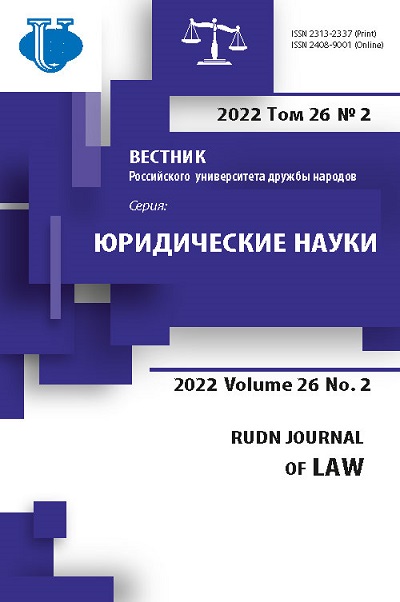Imprisonment and organization of prison labor in Scandinavian states
- Authors: Dobryakov D.A.1
-
Affiliations:
- Peoples’ Friendship University of Russia (RUDN University)
- Issue: Vol 26, No 2 (2022)
- Pages: 403-418
- Section: CRIMINAL LAW AND CRIMINOLOGY
- URL: https://journals.rudn.ru/law/article/view/31091
- DOI: https://doi.org/10.22363/2313-2337-2022-26-2-403-418
- ID: 31091
Cite item
Abstract
The development of society and dominant ideas about humanism and human rights require actualization of the legal regulation of various areas of social relations. It also involves the issues of criminal punishment, process and conditions of its execution, and the prison labor of convicts. This article is devoted to the analysis of the Northern Europe states’ experience of penal systems organization and especially conditions of the imprisoned persons’ labor. The issues of convicts’ recruitment goals, mandatory nature of their labor and alternative types of activities, grounds and procedure for remuneration of the work they perform are in the focus. In addition to the “traditional” Scandinavian states (Sweden, Denmark, and Norway), attention is also paid to the experience of Finland, which is close to the above states in many ways. The analysis of foreign practices is carried out in the context of problems existing in the penitentiary system of the Russian Federation. The results and formulated conclusions may be useful for subsequent scientific research, as well as revising Russian legislation and law enforcement practice connected with prison sentences execution and labor administering.
About the authors
Denis A. Dobryakov
Peoples’ Friendship University of Russia (RUDN University)
Author for correspondence.
Email: den-dobryakov@yandex.ru
ORCID iD: 0000-0002-2384-8659
Candidate of Legal Sciences (PhD), Senior Lecturer of the Department of Judicial Power, Law-Enforcement and Human Rights Activities, Law Institute
6 Miklukho-Maklaya str., Moscow, 117198, Russia FederationReferences
- Antonyan, Yu.M. & Eminov, V.E. (2014) Crime and Punishment. Criminal Psychological Analysis. Moscow, Norma, INFRA-M Publ. (in Russian).
- Denisovich, V.V. (2014) Criminology of criminal subculture. Bulletin of Chelyabinsk State University. 20 (349), 62-65. (in Russian).
- Gamanenko, L.I. & Kuznetsov, V.I. (2015) Vocational education in places of confinement as a means of convicts’ resocialization and their social adaptation after release. Perm University Herald. Yuridical Sciences. 2 (28), 125-132. (in Russian).
- Goldina, E.V. & Yutyaeva, L.E. (2016) The experience of Scandinavian countries in rehabilitation of convicts. Bulletin of the Samara law institute. 3 (21), 134-136. (in Russian)
- Hofer, H. von (2003) Brott och straff i skandinavien. En överblick [Crime and Punishment in Scandinavia. An Overview]. Nordisk Tidsskrift for Kriminalvidenskab. 90 (3), 178-191. (in Swedish)
- Khairullin, V.I. & Yusupova, Z.A. (2019) On the penitentiary experience of Scandinavian countries. Eurasian advocacy. 1 (38), 82-85. (in Russian)
- Lappi-Seppälä, T. (2012) Explaining National Differences in the Use of Imprisonment. The Journal of Social Policy Studies. 4 (10), 457-484. (in Russian)
- Lahti, R. (2000) Towards a rational and humane criminal policy? Trends in scandinavian penal thinking. Journal of Scandinavian Studies in Criminology and Crime Prevention. 1 (2), 141-155.
- Pratt, J. (2008a) Scandinavian exceptionalism in an era of penal excess. Part I: the nature and roots of Scandinavian exceptionalism. The British Journal of Criminology. 2 (48), 119-137.
- Pratt, J. (2008b) Scandinavian exceptionalism in an era of penal excess. Part II: does Scandinavian exceptionalism have a future. The British Journal of Criminology. 3 (48), 275-292.
- Raskevich, A.A. (2010) Labor as the mean of offenders’ rehabilitation: penitentiary problems. Vestnik of the St. Petersburg University of the Ministry of Internal Affairs of Russia. 2 (46), 77-84. (in Russian)
- Rezhapova, I.M. (2020) Education for convicted prisoners abroad. Teoriya i praktika sociogumanitarnyh nauk [Theory and practice of socio-humanitarian studies], 20. 1 (9), 56-62. (in Russian)
- Rezhapova, I.M. (2021) The role of penitentiary education in the subsequent resocialization of convicted persons (foreign experience). Teoriya i praktika sociogumanitarnyh nauk [Theory and practice of socio-humanitarian studies], 1 (13), 47-52. (in Russian)
- Seliverstov, V.I. (2016) Criminal and criminal enforcement policy in sphere of enforcement of imprisonment: novations in 2015. Lex Russica. 9 (118), 188-204. (in Russian).
- Shammas, V.L. (2015) A prison without walls: Alternative incarceration in the late age of social democracy. Prison Service Journal. 217, 3-9.
- Smykalin, A.S. (1998) Penitentiary system of the Soviet Russia in 1917 - early 60th: historical-legal research. Author. of dis. ... doctor of legal sciences. Ekaterinburg. (in Russian).
- Teplyashin, P.V. (2020) Neoliberal development of penitentiary systems. Monograph. Moscow, Yurlitinform Publ. (in Russian)
- Teplyashin, P.V. (2019) European penitentiary systems (theoretical and applied and comparative and legal study). Dis. ... doctor of legal sciences. Krasnoyarsk. (in Russian).
- Tkachevskiy, Yu.M. (2006) Regime of serving and executing an imprisonment sentence. Legislation. 2, 73-81. (in Russian).
- Utkin, V.A. (2015) On legal regulation of the labour of convicts in correctional institutions of the Russian Federation. Russian Journal of Criminal Law. 2 (6), 81-88. (in Russian).
- Voronov, A.M. (2021) Legal opposition to the criminal subculture as a threat to the national security of modern Russia. Vestnik of Moscow University of the Ministry of Internal Affairs of Russia. 5, 67-72. https://doi.org/10.24412/2073-0454-2021-5-67-72 (in Russian)
- Yavorskii, M.A. (2017) Deradicalization of Prisoners in the Prisons of Nordic Countries. Bulletin of the Kazan Law Institute of MIA of Russia. 3 (7), 43-50. (in Russian)
Supplementary files















